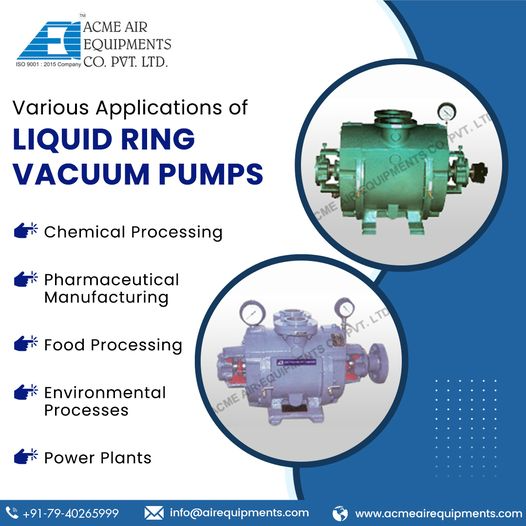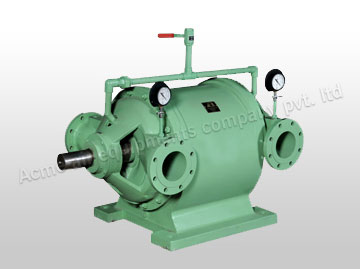Vacuum pumps play a crucial role in various industrial processes, providing solutions for applications such as distillation, degassing and filtration. In Nigeria, key industries like oil and gas, manufacturing and food processing rely heavily on these pumps. However, its widespread adoption is significantly influenced by government policies, which may offer financial incentives, subsidies or regulations that encourage the use of more advanced equipment, including water ring vacuum pumps, liquid ring vacuum pumps and oil-sealed vacuum pumps.
This article explores how government policies in Nigeria support the adoption of different types of vacuum pumps and its impact on the country’s industrial growth. We will focus on how specific pump types, such as the Two Stage Liquid Ring Vacuum Pump, play an essential role in Nigeria’s diverse industries, from Lagos to Port Harcourt and how these pumps help in maintaining efficiency and productivity in industrial processes.
The Role of Vacuum Pumps in Nigeria’s Key Industries
Before delving into the government policies, it’s essential to understand why vacuum pumps are so critical in Nigerian industries. Vacuum pumps, such as the water ring vacuum pump, oil-sealed vacuum pumps and liquid ring vacuum pumps, are used in a range of processes like:
- Oil and Gas Industry: In the extraction and processing of oil, vacuum pumps help maintain the required pressure levels and ensure efficient separation of liquids and gases.
- Manufacturing: These pumps assist in creating the necessary conditions for drying, coating and molding, which are integral to various manufacturing processes.
- Food Processing: Vacuum pumps are used for dehydration and preserving food, ensuring better storage and longer shelf life.
- Chemical and Pharmaceutical: These pumps provide essential functions like vacuum distillation and degassing in both chemical synthesis and pharmaceutical manufacturing.
In each of these industries, the choice of the vacuum pump is influenced by the specific demands of the process, which is why it’s vital to explore how government policies can facilitate or hinder the adoption of these technologies.
Types of Vacuum Pumps Commonly Used in Nigeria’s Industries
Nigeria’s key industries rely on different types of vacuum pumps, each suited for specific tasks. Some of the most common pumps include:
Water Ring Vacuum Pumps
A water ring vacuum pump is a positive displacement pump that uses water to create a vacuum. These pumps are widely used in industrial applications where continuous operation with minimal maintenance is required. The water ring vacuum pump working principle involves water forming a rotating ring inside the pump casing, creating a low-pressure area.
- Common Applications: Oil and gas, food processing and chemical industries.
- Advantages: Durable, energy-efficient and easy to maintain.
Liquid Ring Vacuum Pumps
A liquid ring vacuum pump operates similarly to a water ring vacuum pump but may use other fluids (like oil or glycol) instead of water. These pumps are particularly useful in applications requiring high levels of vacuum pressure.

- How does a liquid ring vacuum pump work? It uses a rotating liquid ring within a cylindrical casing to compress and exhaust gases, generating the vacuum.
- Common Applications: Chemical plants, pharmaceutical processing and mining operations.
Two Stage Liquid Ring Vacuum Pumps
A Two Stage Liquid Ring Vacuum Pump is a more advanced version of the standard liquid ring pump, designed for higher efficiency at higher vacuum levels. In this system, two liquid ring pumps operate in series. The discharge from the first stage is directed into the suction port of the second stage, enhancing the overall vacuum performance.
- Advantages: Two-stage pumps offer greater control over the vacuum process, which is beneficial in industries like chemical processing and pharmaceuticals.
- Common Applications: Two-stage liquid ring vacuum pumps are commonly used in industries handling solvents, chemical distillation and high-precision pharmaceutical processes. They are also crucial in applications where deep vacuum levels are required for efficient product recovery and process optimization.
Oil-Sealed Vacuum Pumps
Oil-sealed vacuum pumps are critical for processes that demand high levels of vacuum. The oil helps seal the pump’s moving parts, preventing wear and ensuring longer operational lifespans. These pumps are often used in applications like vacuum metallurgy and vacuum packaging.
- Advantages: High-performance, capable of handling low-pressure applications and suitable for continuous operation.
Government Policies Promoting Vacuum Pump Adoption in Nigeria
Nigeria’s government has implemented several policies aimed at promoting industrial growth and this extends to the adoption of modern technologies, including vacuum pumps. These policies can include tax incentives, subsidies and regulations that encourage local industries to invest in better vacuum pump technologies, ensuring smoother and more efficient operations across different sectors.
Incentives for Manufacturing
Nigeria’s government has created incentives to encourage manufacturing. These policies help reduce the cost of acquiring industrial equipment, including vacuum pumps. By making it more affordable to purchase pumps such as water ring vacuum pumps and oil-sealed vacuum pumps, manufacturers can improve efficiency and reduce production costs.
Energy Efficiency Regulations
In recent years, Nigeria has introduced policies focused on improving energy efficiency within industries. These regulations encourage the adoption of energy-saving equipment, such as liquid ring vacuum pumps, which consume less power while delivering better performance. Such policies contribute to long-term savings for businesses while promoting industrial growth.
Subsidies for Oil and Gas Industries
The oil and gas sector, which is one of the largest industries in Nigeria, has also benefited from government subsidies for the procurement of vacuum pumps. The government offers financial incentives to oil and gas companies to invest in modern equipment like the Two Stage Liquid Ring Vacuum Pump, which is essential for extracting and processing oil more efficiently.
Impact of Government Policies on Vacuum Pump Adoption in Nigeria
Government policies not only support the acquisition of vacuum pumps but also shape its usage and application in Nigeria’s industries. These policies directly influence industrial productivity and global competitiveness by ensuring businesses have access to the latest vacuum technology. Here’s how government policies impact vacuum pump adoption:
Encouraging Technological Advancements
By offering incentives for industries to adopt advanced vacuum pump systems like two-stage liquid ring vacuum pumps and oil sealed vacuum pumps, Nigeria’s government fosters technological advancements. This helps industries maintain international competitiveness, particularly in sectors such as oil and gas, chemical processing and manufacturing.
Boosting Industrial Efficiency
The adoption of efficient vacuum pumps, supported by favorable government policies, leads to significant improvements in industrial efficiency. For example, the water ring vacuum pump is known for its ability to maintain consistent vacuum pressure over long periods, which can boost productivity in applications like distillation and filtration.

Reducing Environmental Impact
The government also incentivizes industries to adopt cleaner and more energy-efficient technologies. Vacuum pumps like the liquid ring vacuum pump are well-suited for industries looking to reduce energy consumption and improve its environmental performance, making them an attractive option in light of Nigeria’s growing commitment to improving its environmental footprint.
The Future of Vacuum Pump Technology in Nigeria
Looking ahead, the future of vacuum pump technology in Nigeria appears promising. As industries continue to expand and modernize, the need for high-performance vacuum pumps will only increase. With ongoing government support in the form of policies that encourage innovation, Nigerian industries will likely see greater efficiency and reduced operational costs.
Key Developments to Expect
- Growth of the Oil and Gas Sector: As Nigeria’s oil and gas industry continues to grow, demand for advanced vacuum pumps like the Two Stage Liquid Ring Vacuum Pump will increase, especially for refining and processing tasks.
- Expansion of Manufacturing: The Nigerian manufacturing sector, including automotive, food and pharmaceuticals, will continue to benefit from government policies that encourage the adoption of more efficient and cost-effective vacuum pumps.
FAQs About Vacuum Pumps
1. What are the advantages of using water ring vacuum pumps in Nigeria’s industries?
Water ring vacuum pumps offer durability, energy efficiency and minimal maintenance, making them ideal for industries like oil and gas, food processing and chemicals.
2. How does the Nigerian government support the adoption of vacuum pumps?
The Nigerian government offers subsidies, tax incentives and energy efficiency regulations that encourage industries to adopt modern vacuum pump technologies, boosting productivity and reducing operational costs.
3. What industries in Nigeria benefit the most from vacuum pumps?
The oil and gas, manufacturing, food processing and chemical industries in Nigeria benefit the most from vacuum pumps, which are used for distillation, degassing, drying and refining.
4. What is the difference between a water ring vacuum pump and a liquid ring vacuum pump?
While both pumps operate using the same basic principle, water ring pumps typically use water, whereas liquid ring pumps can use other fluids like oil or glycol.
5. How do two-stage liquid ring vacuum pumps enhance industrial efficiency?
Two-stage liquid ring vacuum pumps are known for its ability to generate higher vacuum pressures, which increases efficiency in applications like chemical processing and oil refining.
Conclusion
Government policies in Nigeria are playing a pivotal role in supporting the adoption of advanced vacuum pump technologies in key industries. Through financial incentives, energy efficiency regulations and subsidies, the Nigerian government is fostering industrial growth, boosting efficiency and promoting technological innovation. The continued investment in vacuum pump technologies such as water ring vacuum pumps, oil-sealed vacuum pumps and liquid ring vacuum pumps is essential for Nigeria’s industries to stay competitive in an increasingly globalized market.





